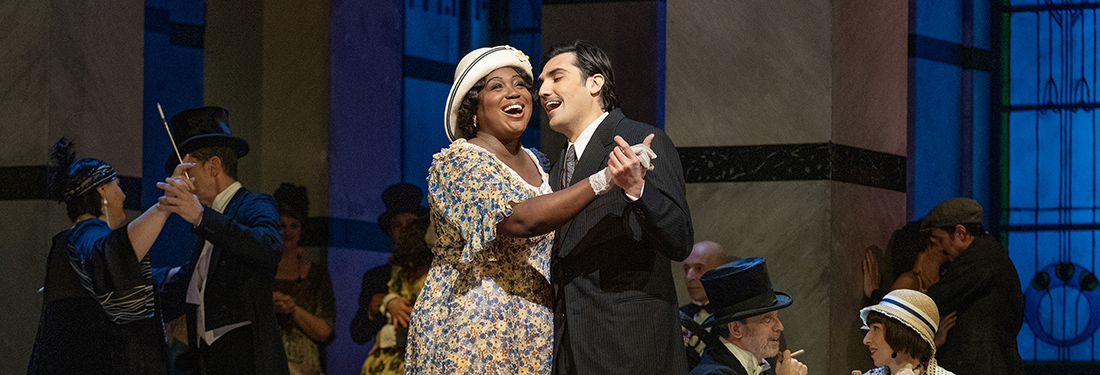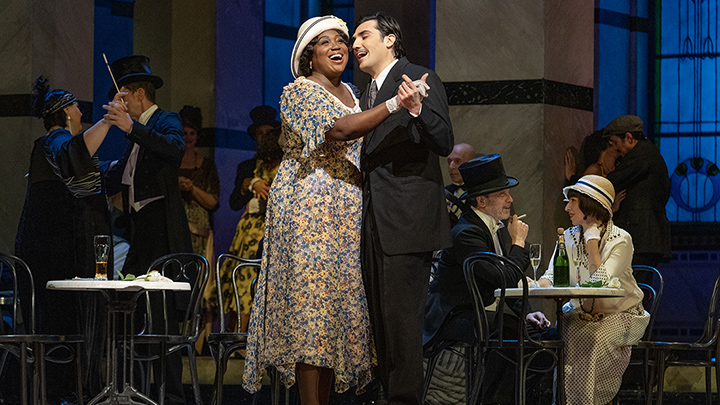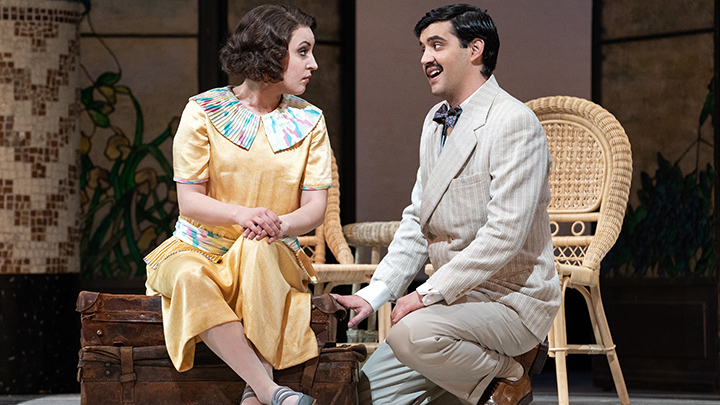In these hundred years for the reason that composer’s dying, La rondine has acquired any variety of both affectionate or disapproving superlatives. However “most literary” absolutely deserves to be one in all them, as effectively.
Rondine spurts late from the Decadent vein that gained steam in Europe on the finish of the 19th century – its libretto, a greater than serviceable textual content by Giuseppe Adami — is concurrently a parody of that period (with the pretentious aesthete and poet Prunier as a stand-in for Gabriele D’Annunzio) but derives its construction from the idiom at which it pokes enjoyable (the libretto is peppered with D’Annunzio easter eggs — from the photographs of cascading flowers to the “santo amor” of the “eletta” Magda). There may be virtually all of Rondine and far, way more (together with a really kinky scene with tea referenced at the start of Act III) should you learn his Piacere.
However D’Annunzio was in the end a Wagnerian and the operetta aspirations of Rondine specific themselves in a ceaselessly recycled parade of whistleable, dancey melodies which resurface at key moments. If the opera mocks the nostalgia for a decidedly anti-nostalgia aesthetic second, its impact is at the least partially depending on our personal means to reminisce throughout the opera itself. Its dramaturgical logic is at all times doubling again on itself and mawkish love is the germ invading Paris and invading the rating itself. Puccini, you sly bastard! You’ve been in on it the entire time.
So, what’s a wistful woman like Magda, the flighty swallow of the opera’s title, to do, caught within the heart of it as she is? Angel Blue, debuting the function of a stored girl who steps out for love, solely to be lured again to the large metropolis by a mixture of guilt and monetary necessity (sound acquainted?), about met my expectations; it’s a thick, wealthy sound, fairly safe if considerably missing in dynamic nuance (or any float) throughout the vary, however there’s not a sarcastic, a lot much less “perversa,” bone in her physique. As an alternative she’s all earnestness and creamy vocalism, a decidedly Lutheran Magda whose second Act I aria, through which she satirically tries to impart a lesson on love the she herself is but to really be taught, regarded extra like Minnie’s Bible scene than any form of sexed-up college for lovers.
However there’s a heat to her naivete that nearly redeems what was inevitably a temperamental mismatch (Rondine die-hards can be smart to catch Ailyn Pérez as a really perfect Magda in DC in about 10 days). Ranging from the Doretta aria, which started a bit of one-note (loud) and grew to a dreamy climax regardless of the alacrity with which conductor Speranza Scappucci goaded it alongside, she progressively attracts a melancholy veil over her sound because the opera goes on and in Act III, the regular fever of Scappucci’s orchestra pit spiked continuously with some surprising moments of chesty drama from her prima donna. If the wanness of her ultimate “ah,” proper after she decides to depart a devastated Ruggero, about summed up the forthright blankness of her tackle the half, the entire thing proved nonetheless a worthwhile experiment, greater than competent and sumptuously sung.
Extra satisfying, although, and extra hotly anticipated, was the home debut of Jonathan Tetelman as Ruggero. A lot because the character appears transplanted from one other period of opera, Tetelman was a hanging import from his very first aria (“Parigi, città dei desideri”), sung with such lightness of assault however lengthy, mild phrases. The carriage of the voice is unimpeachable and regardless of a lithe, patinaed timbre (which melded properly with Blue’s plusher sound), he nonetheless has squillo and fortissimo excessive notes in reserve. However past that, he’s exceptionally interesting onstage. Unpretentious, an agile actor, and his long-legged handsomeness has a puppydog high quality that afforded a marked ratcheting as much as the warmth of Magda and Ruggero’s hobbled Act III bliss. We’ll see how this persona fares for the much less sympathetic Pinkerton subsequent month, however his vocal stylishness and refreshingly gallant bearing have been a successful mixture within the strongest of the night’s three very polished debuts.
Emily Pogorelc, as Magda’s mouthy maid Lisette, saturated the half with spark and chunk. She rides her mild lyric instrument laborious and the decrease writing for Act III brushes the higher limits of audibility, however the darker undertones on the heart of her vary have a scrumptious complexity to them and she or he’s an apt comedienne. Bekhzod Davronov accomplished the lead quartet as a boyish Prunier with a tawny evenness of tone that complemented each Pogorelc and Tetelman. In Act II’s quartet, Scappucci introduced them progressively to climax with a quicksilver nimbleness that overflowed with element but narrowly escaped turning lumbering. In truth, the identical could possibly be stated for her conducting all night; from spiky dissonances within the overture to a refreshing azure transparency within the cloying technicolor pages that open Act III, Scappucci could be relied on to reliably (and infrequently, amongst her colleagues) carry a point-of-view to the Puccini scores she conducts. The protecting of the singers that marked the primary half of Act I (together with the sharpened, menacing brusqueness of Alfred Walker as Magda’s keeper, Rambaldo), which I think about will enhance all through the run, could be forgiven.
Nicholas Joel’s Nineteen Twenties manufacturing is easy in its storytelling, however its good-looking units by Ezio Frigerio are too open and ethereal for a narrative that’s essentially about emotions of suffocation. The tortured saga of Franca Squarciapino’s principally elegant costumes for this manufacturing continues right here (Angela Gheorghiu, who originated the manufacturing, initially insisted on her personal flapperware), and I’ll solely say that Angel Blue’s costumes are extra flattering than the publicity pictures would have you ever consider.
This high-quality revival proved a welcome return for Puccini’s little hen to its outsized, gilded Metropolitan nest and the curtain calls have been among the most genuinely emotional I’ve seen in current reminiscence. If the opera’s recherché cynicism and retrograde cultural commentary have blocked it from the usual repertoire, its power and sweetness contributed to a contented reception on Tuesday. It was a promising begin to New York’s Decadent operatic spring which incorporates the upcoming home debut of Asmik Grigorian as Butterfly and the home premiere of Nadia Boulanger’s solely opera, La Ville Morte (itself based mostly on a play by D’Annunzio), by Catapult Opera in April.
Pictures: Karen Almond/MetOpera


